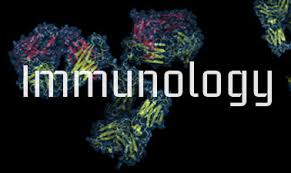What is immunology?
Immunology is the study of the immune system and is a very important branch of the medical and biological sciences. The immune system protects us from infection through various lines of defence. If the immune system is not functioning as it should, it can result in diseases, such as autoimmunity, allergy and cancer. It is also now becoming clear that immune responses contribute to the development of many common disorders not traditionally viewed as immunologic, including metabolic, cardiovascular, and neurodegenerative conditions such as Alzheimer’s.
Why is immunology important?
From Edward Jenner’s pioneering work in the 18th Century that would ultimately lead to vaccination in its modern form (an innovation that has likely saved more lives than any other medical advance) to the many scientific breakthroughs in the 19th and 20th centuries that would lead to, amongst other things, safe organ transplantation, the identification of blood groups, and the now ubiquitous use of monoclonal antibodies throughout science and healthcare, immunology has changed the face of modern medicine. Immunological research continues to extend horizons in our understanding of how to treat significant health issues, with ongoing research efforts in immunotherapy, autoimmune diseases, and vaccines for emerging pathogens, such as Ebola. Advancing our understanding of basic immunology is essential for clinical and commercial application and has facilitated the discovery of new diagnostics and treatments to manage a wide array of diseases. In addition to the above, coupled with advancing technology, immunological research has provided critically important research techniques and tools, such as flow cytometry and antibody technology.
What is an immunologist?
An immunologist is a scientist and/or clinician who specialises in immunology. Many immunologists work in a laboratory focusing on research, either in academia or private industry (e.g. in the pharmaceutical industry). Other immunologists – “clinical immunologists” – are clinicians who focus on the diagnosis and management of diseases of the immune system, such as autoimmune diseases and allergies.
The immune system
The immune system is a complex system of structures and processes that have evolved to protect us from disease. Molecular and cellular components make up the immune system. The function of these components is divided up into nonspecific mechanisms, those which are innate to an organism, and responsive responses, which are adaptive to specific pathogens. Fundamental or classical immunology involves studying the components that make up the innate and adaptive immune system.
Innate immunity is the first line of defence and is non-specific. That is, the responses are the same for all potential pathogens, no matter how different they may be. Innate immunity includes physical barriers (e.g. skin, saliva etc) and cells (e.g. macrophages, neutrophils, basophils, mast cells etc). These components ‘are ready to go’ and protect an organism for the first few days of infection. In some cases, this is enough to clear the pathogen, but in other instances, the first defence becomes overwhelmed and the second line of defence kicks in.
Adaptive immunity is the second line of defence which involves building up a memory of encountered infections so can mount an enhanced response specific to the pathogen or foreign substance. Adaptive immunity involves antibodies, which generally target foreign pathogens roaming free in the bloodstream. Also involved are T cells, which are directed especially towards pathogens that have colonised cells and can directly kill infected cells or help control the antibody response.
Immune dysfunction and clinical immunology
The immune system is a highly regulated and balanced system and when the balance is disturbed, disease can result. Research in this area involves studying a disease that is caused by immune system dysfunction. Much of this work has significance in the development of new therapies and treatments that can manage or cure the condition by altering the way the immune system is working or, in the case of vaccines, priming the immune system and boosting the immune reaction to specific pathogens.
Immunodeficiency disorders involve problems with the immune system that impair its ability to mount an appropriate defence. As a result, these are almost always associated with severe infections that persist, recur and/or lead to complications, making these disorders severely debilitating and even fatal. There are two types of immunodeficiency disorders: primary immunodeficiencies are typically present from birth, are generally hereditary and are relatively rare. Such an example is common variable immunodeficiency (CVID). Secondary immunodeficiencies generally develop later in life and may result following an infection, as is the case with AIDS following HIV infection.
Autoimmune diseases occur when the immune system attacks the body it is meant to protect. People suffering from autoimmune diseases have a defect that makes them unable to distinguish ‘self’ from ‘non-self’ or ‘foreign’ molecules. The principles of immunology have provided a wide variety of laboratory tests for the detection of autoimmune diseases. Autoimmune diseases may be described as ‘primary’ autoimmune diseases, like type-1 diabetes, which may be manifested from birth or during early life; or as ‘secondary’ autoimmune diseases, which manifest later in life due to various factors. Rheumatoid arthritis and multiple sclerosis are thought to belong to this type of autoimmunity. Also, autoimmune diseases can be localised, such as Crohn’s Disease affecting the GI tract, or systemic, such as systemic lupus erythematosus (SLE).
Free Immunology Books
CLICK HERE TO DOWNLOAD Immune System and Immunology
[pdf-embedder url=”https://www.publichealth.com.ng/wp-content/uploads/2020/08/IMMUNE-SYSTEM-AND-IMMUNOLOGY.pdf” title=”IMMUNE SYSTEM AND IMMUNOLOGY”]
CLICK HERE TO DOWNLOAD: Understanding Basic Immunology
[pdf-embedder url=”https://www.publichealth.com.ng/wp-content/uploads/2020/08/Understanding-Basic-immunology.pdf” title=”Understanding Basic immunology”]
CLICK HERE TO DOWNLOAD: Immunology Pdf
[pdf-embedder url=”https://www.publichealth.com.ng/wp-content/uploads/2020/08/Immunology.pdf”]





